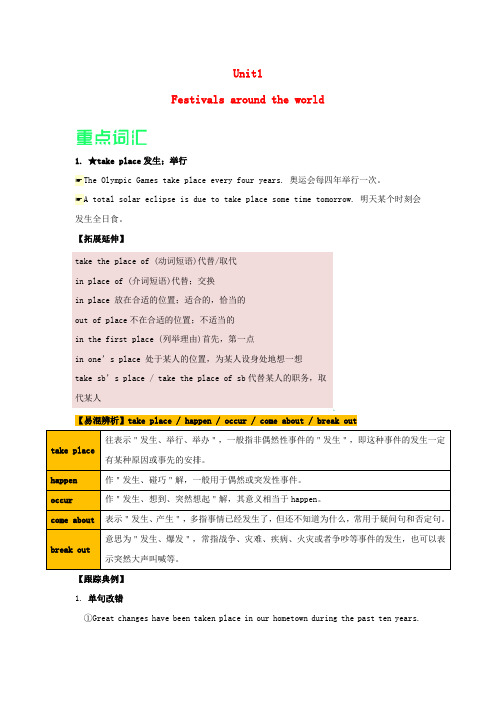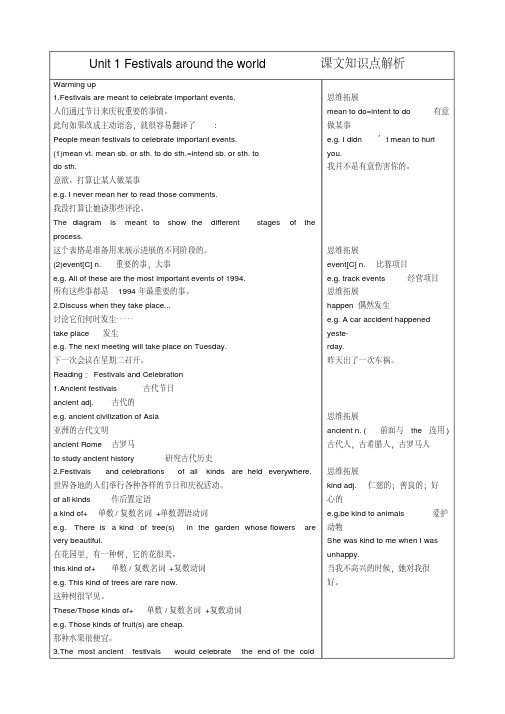Unit1FestivalsAroundtheWorld知识点复习总结
- 格式:doc
- 大小:140.00 KB
- 文档页数:13

Unit1Festivals around the world1. ★take place 发生;举行☛The Olympic Games take place every four years. 奥运会每四年举行一次。
☛A total solar eclipse is due to take place some time tomorrow. 明天某个时刻会发生全日食。
【拓展延伸】take the place of (动词短语)代替/取代in place of (介词短语)代替;交换in place 放在合适的位置;适合的,恰当的out of place 不在合适的位置;不适当的in the first place (列举理由)首先,第一点in one ’s place 处于某人的位置,为某人设身处地想一想take sb ’s place / take the place of sb 代替某人的职务,取代某人【易混辨析】take place / happen / occur / come about / break out【跟踪典例】 1. 单句改错①Great changes have been taken place in our hometown during the past ten years.②Some people think that robots will take the place human beings.2. 完成句子①我突然想起我昨天见过他。
____________________________________ I saw him yesterday.②当二战爆发的时候,他还在德国。
When the Second World War ____________________________________, he was in Germany.③我不明白你怎么会又迟到了。


Unit1知识点总结1.dress sb 给某人穿衣服2.be dressed in穿着…3.dress up盛装4.play a trick on=play tricks on开玩笑5.play a joke on=play jokes on6.make fun of =laugh at7.admire sb. for sth因…羡慕钦佩某人8.look forward to doing sth期待9.look down upon瞧不起10.as if =as though好像11.even if =even though尽管12.award sb sth=award sth to sb授予某人某奖win/receive/get an award for…因…获奖13.turn up出现;调大14.turn down调小;拒绝15.turn on/off打开;关掉16.turn out证明是,结果是17.turn to sb for help向某人求助18.turn in 上交in turn轮流19.keep/break/eat one’word食言;失言20.have a word with sb与某人交谈21.have words with sb与某人争吵22.in a word 总而言之23.in other words换句话说24.hold one’s breath屏息25.lose one’s breath喘不过气26.set off动身;使爆炸27.set up建立28.set down记下写下29.set out to do=set about doing开始着手做某事30.remind sb of sth=remind sbto do sth提醒某人做某事31.forgive sb for sth原谅某人32.apologize to sb for sth=make an apology to sb for sth.因某事向某人道歉33.may/might用法1.he may/might have done his homework.(表可能性)2.may I come in? ---yes, you can./No, you can’t/mustn’t.(表许可)3.May God bless you!(祝愿)4.May/might as well不妨34.can/could 的用法1.Believe me I can do it well.(能力)2.She can’t make a mistake. she is always serious.(可能性)3.Can I use your dictionary?(请求允许)4.It can’t be true.How can you do that?(表惊诧或怀疑)5.can’t/could n’t….too much再…也不为过35.must用法1.”必须”Must I hand in today?----yes,you must.------No, you needn’t./you don’t have to.2.有把握的推测Look at the wet ground it must have rained last night.3.”偏要”36.shall用法用于第一第三人称,征求对方意见或请求Shall we/he going shopping.用于第二第三人称命令威胁许诺You shall be punished if you break the laws.36.Should 用法1.出于责任义务该做某事2.“竟然”I can’t imagine such a graceful lady should be so rude.。

Unit 1 Festivals around the world 课文知识点解析Warming up1.Festivals are meant to celebrate important events.人们通过节日来庆祝重要的事情。
此句如果改成主动语态,就很容易翻译了:People mean festivals to celebrate important events.(1)mean vt. mean sb. or sth. to do sth.=intend sb. or sth. todo sth.意欲、打算让某人做某事e.g. I never mean her to read those comments.我没打算让她读那些评论。
The diagram is meant to show the different stages of the process.这个表格是准备用来展示进展的不同阶段的。
(2)event[C] n.重要的事,大事e.g. All of these are the most important events of 1994.所有这些事都是1994年最重要的事。
2.Discuss when they take place...讨论它们何时发生……take place 发生e.g. The next meeting will take place on Tuesday.下一次会议在星期二召开。
Reading:Festivals and Celebration1.Ancient festivals 古代节日ancient adj. 古代的e.g. ancient civilization of Asia亚洲的古代文明ancient Rome 古罗马to study ancient history 研究古代历史2.Festivals and celebrations of all kinds are held everywhere. 世界各地的人们举行各种各样的节日和庆祝活动。

Unit 1Festivals around the world1.celebrate v.__庆祝;祝贺__2.__feast__ n.盛宴;节日3.observe v t. __庆祝;遵守__4.__custom__ n.风俗;习俗5.__traditional__ adj.传统的6.__dress up__ 盛装;打扮7.fall on(some day)__(节日、生日等)是在(某天)__8.get together__聚会;联欢__9.exchange gifts__交换礼物__10.__attend__ a ceremony出席仪式11.__family reunion__ 家庭团聚12.admire the moon__赏月__13.__a display of firework__ 烟花表演14.follow a custom __遵循习俗__15.pass down from generation to generation__一代一代传下来__1.The Spring Festival is the most energetic and important festival for Chinese people, __which takes place__ in the Lunar New Year.春节对中国人来说是最有活力、最重要的节日,在农历新年时举行。
2.The Mid-Autumn Festival is a traditional festival of China, __which is actually a day for family reunion__ .中秋节是中国的传统节日,实际上是家人团聚的日子。
3.__As Teachers’Day was approaching__ , our class decided to hold a party to __celebrate the important day__ for a change this year.随着教师节的临近,今年为了换一种方式来庆祝这个重要的日子,我们班决定举办一场晚会。

人教英语必修三Unit 1 Festivals around the world 知识点解析1. The most ancient festivals would celebrate the end of the cold weather, planting in spring and harvest in autumn. (Reading)would在此表示过去的习惯性动作,可译为“总会”。
又如:Whenever I went to see him, he would treat me with some home-made cakes.每次我去看他,他总是用自制的糕点招待我。
would 还有以下用法:(1)表示意愿。
如:He wouldn’t let the doctor take his blood pressure.他不愿意让医生量他的血压。
(2)表示猜测。
如:That would be in 1976, I think.我想那大概是在1976年。
(3)表示倾向。
如:The window wouldn’t open.窗子怎么也打不开。
2. The most energetic and important festivals are the ones that look forward to the end of winter and to the coming of spring.(Reading)look forward to指热切地期盼着一件事或行动。
此短语中的to是介词,所以后面的宾语应为名词或动词的-ing形式。
如:We are looking forward to my uncle’s visit with great pleasure.我们高兴地等着叔叔来作客。
We’re looking forward to seeing him again.我们期望再见到他。
含有介词to的动词短语还有lead to(导致,通向), be/get used to(习惯于), pay attention to(注意), devote...to(致力于,献身于), prefer...to(喜欢……胜过……), get down to(开始认真干某事)等。
Unit1 Festivals Around the World 词汇讲义1. take place发生;举行In the meantime, an economic crisis took place.The Olympic Games take place every four years.take place / happen / break out / occurtake place通常表示计划、安排之内的“发生”。
happen指事情偶然的发生,常带有未能预见的含义;另外,还有“碰巧”之意。
break out指火灾、战争或瘟疫的突然爆发。
occur 指按计划发生,常指(某想法、某事)出现在某人的头脑中。
常见结构:It occurs/occurred to sb. that表示“某人想起某事”。
It occurred to me that I had forgotten my keys.①It was in the church that their wedding _________________ (举行).②Will you attend the meeting _____________(代替) me?③(就座), please!We are ready to start.2. in memory of=to the memory of作为对某人的纪念;纪念某人(memory前不加任何冠词)Many ceremonies are in memory of famous people.They will build a monument in memory of the national hero.A. in place ofB. in search ofC. in memory ofD. in need of(2)用由“in+n.+of”构成的短语填空。
①A monument was set up(纪念) the dead soldiers.3. belief n. [C/U] 信任;信仰,信心believe vi.& vt. 相信常用结构:have belief in sth. / sb.他对他的医生无比信赖。
Unit1 Festivals Around the World 词汇讲义1. take place发生;举行In the meantime, an economic crisis took place.The Olympic Games take place every four years.take place / happen / break out / occurtake place通常表示计划、安排之的“发生”。
happen指事情偶然的发生,常带有未能预见的含义;另外,还有“碰巧”之意。
break out指火灾、战争或瘟疫的突然爆发。
occur 指按计划发生,常指(某想法、某事)出现在某人的头脑中。
常见结构:It occurs/occurred to sb. that表示“某人想起某事”。
It occurred to me that I had forgotten my keys.①It was in the church that their wedding _________________ (举行).②Will you attend the meeting _____________(代替) me?③(就座), please!We are ready to start.2. in memory of=to the memory of作为对某人的纪念;纪念某人(memory前不加任何冠词)Many ceremonies are in memory of famous people.They will build a monument in memory of the national hero.A. in place ofB. in search ofC. in memory ofD. in need of(2)用由“in+n.+of”构成的短语填空。
①A monument was set up(纪念) the dead soldiers.3. belief n. [C/U] 信任;信仰,信心believe vi.& vt. 相信常用结构:have belief in sth. / sb.他对他的医生无比信赖。
She has lost her belief in God.她已不相信上帝。
4. dress up 盛装,打扮(常用于dress up as sb. / dress up in sth.结构)We are supposed to _______________(打扮成) movie characters for the party. What a novel idea!She ______________ (穿着) Elizabethan costume for the fancy dress ball.A. DressedB. To dressC. DressingD. Having dressed5. trickn.①[C]诡计;骗局;谋略;花招One of the problems of old age is that your memory can start to play tricks on you.②窍门,招数,手法Daily practice is the trick in learning a foreign language.He used the old trick of attacking in order to defend himself.The trick is to keep your body still and your arms relaxed.play a trick/tricks on sb. 搞恶作剧;诈骗;开玩笑The children played a trick on their teacher on April Fool’s Day.①Tom liked making fun others in public.②It’s bad manners to laugh the disabled.③These boys like playing tricks their teacher.④He smiled me when he heard my funny answer.6. 易混辨析:gain / win / get / earn / acquiregain指在斗争,竞争中做出很大努力而“获得……”,所得到的东西常具有一定价值。
win含有取胜的一方具有优越的特质或条件而能克服各种障碍的意思,意为“赢得”。
get为普通词,有时指不一定需要努力就能“得到”。
earn意为“赚得”,表示经过艰苦努力所得到的报酬。
acquire意为“获得,取得”,一般指通过漫长的过程而逐渐获得。
①I’m new in the job but I have already _______ experience.②Please me a glass of water.③His perseverance him many friends and a gold medal.④He up to $50,000 a year by writing stories.⑤After six years’ study, he has a good knowledge of English.7. gather vt.1)收集;召集;使聚集[(+together)]He is gathering materials for a new book.The kids were gathered together in one room.2)积聚;积蓄This cloth gathers dust.3)收拾;摘;采集;收割[(+in/up)]The girl is gathering flowers.People slowly gathered their belongings and left the hall.4)渐增The sled gathered speed as it moved down the hill.5)猜想,推测[+(that)]I gather that he is the one in charge.6)使皱起She gathered her brows into a frown.8. award这位裁判判给进入决赛的选手们同样的分数.n.奖,奖品;奖金He got the highest award in the contest.易混辨析:award / prize / rewardaward既可作动词也可作名词,指为鼓励在工作中达到或完成所提出的要求或条件的人而进行的奖励,往往强调荣誉而不在乎奖品的大小或奖金的多少。
prize为名词,多指在各类竞赛、竞争或抽彩中所赢得的奖。
这种奖赏有的凭能力获得,有的凭运气获得。
reward既可作动词也可作名词,指对某人的工作或服务等的报答。
也指因帮助警察抓到罪犯或帮助失主找到东西而得到的赏金、酬金。
He won the award for the best student of the year.A prize was given to the person who had the winning number.He received a medal as a reward for his courage.例:Three university departments have been _____ $600,000 to develop good practice in teaching and learning.A. promotedB. includedC. securedD. awarded9. admirevt.赞美;钦佩;羡慕。
其后可接人或物作宾语,但不可以接宾语从句作宾语。
admire sb. for sth. 因某事钦佩或羡慕某人They admired our garden.I admire him for his success in business.Aren’t you going to admire my new house?admiration n.赞美,钦佩;令人赞美的人或物express admiration for sb. 对某人表示钦佩have great admiration for sb. 十分钦佩某人in admiration of 表示钦佩with/in admiration 心怀钦佩地admirer n. 钦佩者;羡慕者admiring adj 赞赏的,羡慕的10. look forward to期待某事/做某事(to为介词,后接名词或动名词)We should look forward to the futurity.She must be looking forward as much to his return as he himself is to her.A. seeB. have seenC. seeingD. be seeing用括号所给单词的适当形式填空。
1.The boy hurried forward (see) the world famous oil painting because he had been looking forward to ____ (see) it for a long time.2.I used to _________ (get) up late, but now I’m used to _______________ (get) up early.11. as thoughas though / as if引导方式状语从句和表语从句:①引导方式状语从句She acted as though nothing had happened.她装得好像什么事也没发生过似的。
注意:当从句主语和主句主语一致,且从句谓语中含有动词be时,可把主语和be 一起省略。
He looked about as though (he was) in search of something. 他四下望, 好像在寻找什么。
②引导表语从句It looks as if it’s going to rain.看样子要下雨了。
③as though\ as if从句和虚拟语气一、基本用法以as if (as though)引导的方式状语从句或表语从句,有时用虚拟语气。
1.当说话者认为句子所述的是真实的或极有可能发生或存在的事实时,则不用虚拟语气如:It sounds as if it is raining.听起来像是在下雨。